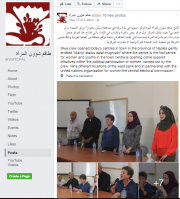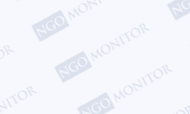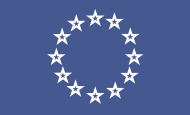Profile
Activity
- Founded in 1966 by five Swedish churches; regional office for the Middle East is located in Jerusalem.
- According to NGO Monitor research, Diakonia has been issued a humanitarian visa for its work in Israel.
- According to its website, “Diakonia is a faith-based Swedish development organization” that claims to promote “human rights, democracy, social and economic justice, gender equality and conflict and justice.”
- In 2004, Diakonia created an International Humanitarian Law (IHL) Resource Centre “to address the ongoing violations of IHL that characterise the Israeli-Palestinian conflict.” (See below for further information regarding the IHL Resource Center.)
Funding
- In 2022, total revenue was SEK 489.3 million; total expenses were SEK 468.4 million, of which SEK 44.9 million was spent on projects in the Middle East.
- Diakonia’s “International Humanitarian Law (IHL) Resource Centre and local partners in Palestine and Israel” has received funding from Sweden, Switzerland, and the Netherlands.
- Sweden, Switzerland, and the Netherlands.
- In 2022, Sweden provided $501,952.
- In 2017-2021, Diakonia’s IHL Resource Center received CHF 1.7 million from SDC/EDA.
- In 2016-2019, the Dutch Ministry of Foreign Affairs granted €241,608.
2018-2022 Funding to Diakonia (amounts in SEK)
| Donor | 2022 | 2021 | 2020 | 2019 | 2018 |
| SIDA (Sweden) | 184.1 million | 176.2 million | 191.1 million | 189.3 million | 181 million |
| Swedish Embassy | 174.3 million | 177.5 million | 254.3 million | 193.3 million | 211.2 million |
| EU | 32.7 million | 33.7 million | 36.4 million | 34.1 million | 28.9 million |
| "Foreign Embassies" | | 5.6 million | 23 million | 16.3 million | 15.4 million |
| "Other" | 11.6 million | 9.1 million | 9.5 million | 8.7 million | 16 million |
Political Advocacy
- Diakonia has provided funding to a number of highly biased and politicized NGOs active in the Arab-Israeli conflict including the Alternative Information Center, B’Tselem, Gisha, Kerem Navot, Physicians for Human Rights – Israel, and Who Profits. Diakonia does not publish amounts it grants to these NGOs, reflecting a lack of transparency and accountability. (See table below for further funding information.)
- In July 2023, Diakonia published a legal brief titled “Excessive Force: A Legal Analysis of Israel’s Operation in Jenin Refugee Camp,” which called on third states to “Exercise ‘due diligence’ and exert pressure on Israel to end ongoing violations of IHL (for example, by means of withholding support)” and “Cooperate with the investigation of international accountability mechanisms such as the ICC.”
- In November 2021, Diakonia condemned the decision by the Israeli Ministry to designate six Palestinian NGOs as terrorist organizations. According to the Diakonia, “In totality, these trends not only curtail and repress the work of the civil society organisations that are directly targeted, but also unjustifiably limit civic space and have a chilling effect on all organisations working on the context, regardless of where they are located.”
- In February 2021, Diakona issued a statement that “Israel is ultimately responsible for the supply of vaccines for Palestinians.” Diakonia falsely claimed that Israel has “legal obligations” to ensure that vaccines be provided to Palestinians living under Israeli occupation and control, while altogether ignoring that Palestinians residing in Jerusalem are part of the Israeli health care system; that under the Oslo Accords the PA is responsible for health care of Palestinians in the West Bank and Gaza; and that the PA has adopted its own vaccine policy for its population.
- In March 2019, Diakonia funded a report by Kerem Navot alleging “Israeli land seizures” in the West Bank, which accused Israel “of Judaizing large parts of the West Bank.”
- In June 2018, during the violence on the Gaza border, Secretary General of Diakonia Georg Andrén wrote an article titled “Gaza: The Perpetrators Must be Brought to Justice,” stating that “Israel’s highest court has gone against international law and given the Israeli army the right to shoot sharply at protesters inside Gaza…we cannot rely on the Israeli courts for the judicial order of Israeli practice of violence in Gaza…What threat did the Palestinian protesters in the Israeli-Gaza border area, and was the Israeli army’s response legitimate or were the protesters in violation of international law?“ Diakonia ignored the violent nature of the protests, which have consisted of an organized armed attack on the Israeli border and IDF positions, attempts to destroy and breach the border fence, and sustained arson, rocket, and mortar attacks on Israeli civilian communities.
- In February 2018, as a member of the Association of International Development Agencies (AIDA), published a report titled “50 Years of Occupation: Dispossession, Deprivation and De-development” that accused Israel of “systemic, decades-long squeeze of Palestinian economic prospects and human rights.” (See more on AIDA below.)
- In 2015, Diakonia issued an “expert legal opinion” on the Gaza Reconstruction Mechanism (GRM), which was distributed among UN officials. Diakonia never published the document, but it was leaked in 2016. The opinion argues that “the GRM is an unbalanced exchange of ‘rights’ and ‘duties’, with the PA [Palestinian Authority] and the UN having a number of duties, while the GoI [Government of Israel] has a number of very wide rights and very few obligations” (p. 2). The document’s sparse mentions of Israeli security concerns are intentionally trivializing:
- “Any jus ad bellum claim Israel might make, to be acting in self-defence, is undermined by the fact that the acts to which it is claiming to respond to in self-defence, i.e. the on-going missile attacks by Hamas, are not confined to the immediate period before Israeli military incursions, indicating that the choice of entering Gaza by force is one exercised by an occupier, deciding when to reassert authority, rather than as a state responding to existential threats against it” (p. 12, emphases added).
- “GoI claims that building materials are ‘dual use’ and may be used to rebuild the ‘terror’ tunnels from Gaza into Israel but, assuming that fear to be well-founded, it would only allow it to restrict those supplies that it has ‘serious reason’ to believe will be used in this way” (p. 13, emphases added).
- While disregarding the deliberate targeting of civilians by Hamas, the opinion insinuates Israeli ulterior motives to abuse the GRM to arbitrarily target civilians in Gaza, claiming that “There is strong evidence of the connection between the GRM and actual and potential violations of core human rights (for example, the right to housing especially in conjunction with the right to life, and the right to life in terms of potential misuse of the database by the GoI for the identification of targets)” (p. 11, emphases added).
- On July 13, 2014, during the 2014 Gaza War, Diakonia published a statement accusing Israel of “collective punishment,” “war crimes,” and “violations of international humanitarian law (IHL),” while ignoring Hamas terror attacks against Israeli civilians and Israel’s legitimate right to self-defense.
- In a 2013 “position paper on Israel/Palestine,” Diakonia tries to justify its bias and advocacy against Israel claiming that “The conflict is highly asymmetric with Israel as a recognized state with an enormous military capacity and ability to create facts on the ground. By moving the conflict from the military to the legal and diplomatic arena, negotiations can be more equal and meaningful.”
- Sponsored a March 2011 exhibit at the Army Museum in Stockholm featuring Israeli NGO Breaking the Silence (BtS). During an interview, BtS representative Itamar Shapira stated: “We are the oppressors, we are the ones that are violating human rights on a daily basis. We are creating the terror against us, basically… This is a war against civilians, a war against society” (emphasis added).
- Diakonia’s submission to the UN’s Goldstone fact-finding inquiry on the 2009 Gaza conflict similarly vilified and demonized Israel, making allegations of “collective punishment,” “war crimes,” and “violation[s] of international humanitarian law.”
- Diakonia’s “International Humanitarian Law” (IHL) program focuses exclusively on Israel, alleging Israeli violations and impunity.
- The IHL Resource Centre receives Swiss humanitarian funding for the explicit purpose of lobbying the EU and other decision-makers. As stated in SDC/EDA’s funding overview on the Resource Centre, “Widespread violations of international law, and the overall climate of impunity, continue to cause human suffering for the ‘Protected Population’.”
- The IHL program provides training seminars to “equip professionals working in or on the context of the occupied Palestinian territory (oPt) with a foundational understanding of the international legal framework applicable in armed conflicts and situations of occupation.”
- In October 2023, Diakonia held a “training for the diplomatic community on international humanitarian law.” The training aimed to “equip them with legal literacy sufficient to inform their engagement with various partners and stakeholders in the context at capital level, and at the international and regional levels.”The training covered topics including “Fragmentation, dispossession, displacement,” “Deprivation of liberty,” and “Implementation and measures for enforcement and accountability.”
- In March 2021, Diakonia’s IHL Centre in Jerusalem commissioned an “expert opinion” by a British law professor, on “whether the prohibition of apartheid applies in situations of occupation and how it interacts with the law of occupation.” According to Human Rights Watch, this was “provided” to them for their own report accusing Israel of apartheid.
- In June 2019, Diakonia sponsored a workshop with Al Mezan titled “Protection and Promotion of IHL in Gaza.” The workshop focused exclusively on documenting alleged Israeli violations while ignoring multiple instances of violence committed by Palestinian factions during the riots that took place on the Israel-Gaza border and instances of Palestinians killed and wounded by rockets launched by Palestinian terror groups.
- In March 2017, Diakonia-IHL Center participated in a side event at the UNHRC titled “Human Rights in Palestine: The ongoing violations and severe suppression,” featuring BDS activists Rania Madi (BADIL), Mahmoud Abu Rahma (Al Mezan), and Michael Lynk (UN Special Rapporteur “on the situation of human rights in the Palestinian Territory occupied since 1967”).
- In 2017, the Resource Center published An Easy Guide to International Humanitarian Law, that focused exclusively on Israeli policies by distorting international law and misusing terms like “occupying power,” “collective punishment,” and “Proportionality.”
Funding and Support of WATC
- In 2016-2019, Diakonia provided SEK 1.6 million the Palestinian NGO Women’s Affairs Technical Committee (WATC).
- In May 2017, WATC inaugurated a youth center in the village of Burqa named after Dalal Mughrabi, a terrorist who in 1978 murdered 37 civilians, including 12 children. WATC donors Norwayand UN Women strongly condemned the use of their funding for this center.
- In June 2017, Diakonia defended WATC’s participation in naming the center, claiming that “WATC has requested that its logo be removed from the center.” Despite this claim, WATC was present at the center’s inauguration and posted photos of the inauguration (the photos were removed on June 1, 2017; see screenshot below).
- In October 2017, WATC rejected demands to take a position on the name of the center and condemned its donors for “conditioning funding.”
- WATC has not made any public statements on its website, Facebook, or Twitter distancing itself from the name of the center.

Source: WATC Facebook: https://www.facebook.com/WATCPAL/ (This post was removed on June 1, 2017.)
Support for BDS
- In May 2016, Diakonia published a report titled, “Same Game, Different Rules,” which called on the international community to “to seriously consider restrictive and other measures against Israel…These may include, but are not limited to: exerting diplomatic pressur [sic]; taking lawful countermeasures; and refusing arms transfers; amongst others.”
- Diakonia has lobbied against the Jerusalem light rail, claiming that the light rail is “reinforcing settlements” and “supporting illegal discrimination of protected persons.”
- Diakonia has funded Who Profits, an Israeli NGO that initiates international BDS campaigns targeting Israeli and foreign banks, security companies, civil infrastructure facilities, and private companies.
- Calls for entities beyond the 1949 Armistice line, including East Jerusalem, to be “excluded from any economic relationships with Israel and Israeli entities.”
- Diakonia was among the 22 NGOs involved in the 2012 publication, “Trading Away Peace: How Europe Helps Sustain Illegal Israeli Settlements.” The document calls for the EU and governments to wage political warfare through economic sanctions (a form of BDS) beginning with “product labeling” against Israel.
Partners
- “Partners” with a number highly biased and politicized NGOs active in the Arab-Israeli conflict, including: DanChurchAid, Palestinian Medical Relief Society, Women’s Affairs Technical Committee, Sabeel, Physicians for Human Rights – Israel, BADIL, Al-Haq, B’Tselem, Al-Mezan, Kerem Navot, Society of St. Yves, Gisha, and Who Profits.
- Diakonia supports the Swedish branch of the Ecumenical Accompaniment Programme in Palestine and Israel (EAPPI) through the recruitment and training of participants.
- EAPPI sends volunteers to the West Bank to “witness life under occupation.” Upon completion of the program, the volunteers return to their home countries and churches where many engage in anti-Israel advocacy, including advocating for BDS campaigns in churches, comparing Israel to apartheid South Africa and Nazi Germany, and other delegitimization strategies.
- Diakonia’s IHL Resource Center’s “funding overview” lists “results from previous phases” of funding to the Resource Centre, which includes “IHL basic training for EAPPI [Ecumenical Accompaniment Programme in Palestine and Israel] members (15 participants).”
- Member of Association of International Development Agencies (AIDA).
- Member of the ACT Alliance, a coalition of 144 churches and church-related organizations.
- Advocacy goals include contributing “to a global discourse on the Israeli-Palestinian conflict that addresses the consequences of occupation, promotes access of individuals to resources, and ultimately brings an end to the occupation” and targeting “Christian communities on the International level…by stressing Christians’ suffering in the Holy Land and seek to preserve Christians presence in Palestine.”
- Urges “various forms of boycott of settlement products,” accusing Israel of denying “Palestinians their fundamental rights of freedom, equality, and self-determination through military occupation.”
- Published a February 2013 Advocacy Paper, “The ‘Permit Regime’ and Israeli Attacks on Palestinian Freedom of Worship,” alleging that “Under Israeli military occupation, repression has become the worst of history compared to that of South Africa. It’s a sophisticated form of social, economic, political and racial discrimination, strangulation, and genocide, incorporating the worst elements of colonialism and apartheid as well as repressive dispossession, displacement and state terrorism to separate Palestinians from their land and heritage, deny them their rightful civil and human rights, and gradually remove or eliminate them altogether. The ID/permit system is one of many elements designed to make greater Israel an ethnically pure Jewish state.”
- Member of ACT Palestine Forum, a coalition of ACT Alliance Members that cooperates in Israel and the West Bank and Gaza under the Act Alliance network.
- Urges “various forms of boycott of settlement products,” accusing Israel of denying “Palestinians their fundamental rights of freedom, equality, and self-determination through military occupation.”
- Published a February 2013 Advocacy Paper, “The ‘Permit Regime’ and Israeli Attacks on Palestinian Freedom of Worship,” alleging that “Under Israeli military occupation, repression has become the worst of history compared to that of South Africa. It’s a sophisticated form of social, economic, political and racial discrimination, strangulation, and genocide, incorporating the worst elements of colonialism and apartheid as well as repressive dispossession, displacement and state terrorism to separate Palestinians from their land and heritage, deny them their rightful civil and human rights, and gradually remove or eliminate them altogether. The ID/permit system is one of many elements designed to make greater Israel an ethnically pure Jewish state.”
- Member of the “Displacement Work Group,” an initiative of Badil and OCHA to “monitor human rights violations (evictions, home demolitions, land confiscations) resulting in the displacement of people from their lands and communities,” along with: Addameer, Al-Haq, Al-Mezan, AIC, ARIJ, Badil, BIMKOM, B’Tselem, CARE Intnl., DCI – Palestine section, Diakonia, EAPPI, Ir Amim, ICAHD, Medical Aid for Palestinians, Oxfam UK, Oxfam Solidarite – Belgium, PA Govt. Spokesperson, PCHR, RHR, Society of St. Yves, Save the Children UK, Shatil, UNFPA, Stop the Wall, ACRI, UNFPA, Yesh Din, and World Vision.
Diakonia Funding to Highly Politicized NGOs (amounts in NIS)
Diakonia does not publish amounts it grants to NGOs, reflecting a lack of transparency and accountability. 2018-2021 figures based on NGO annual reports, 2018-2019 figures based on quarterly reports submitted to the Israeli Registrar for Non-Profits.
| NGO Grantee | 2022 | 2021 | 2020 | 2019 | 2018 |
| Adalah | | | | 89,715 | 144,330 |
| Physicians for Human Rights- Israel (PHR-I) | 413,291 | 301,215 | 363,283 | | 76,935 |
| B'Tselem | | | | 87,125 | 210,610 |
| Sabeel | | | 144,198 | | |
| Kerem Navot | 38,390 | 76,236 | 66,556 | 24,588 | 93,000 |
| Women’s Affairs Technical Committee | | | | 254,548 | 382,950 |
| Health Work Committees | | | | | Unknown Amount |
| PalVision | | | | Unknown Amount | |
Related Articles
Reports
Diakonia is Swedens largest humanitarian NGO, receiving most of its budget from the Swedish government. Some of the organizations programs appear to be genuine and important humanitarian projects. Diakonias Civil Society and International Humanitarian Law (IHL) programs overtly promote the Palestinian narrative, and fuel the conflict. Attributes structural problems in the conflict solely to the continuing of the occupation, the building of the Wall, and the fragmentation of the Palestinian territory. The IHL website promotes a so-called right to resist and delegitimizes Israels right to self defense.
All Articles about Diakonia




